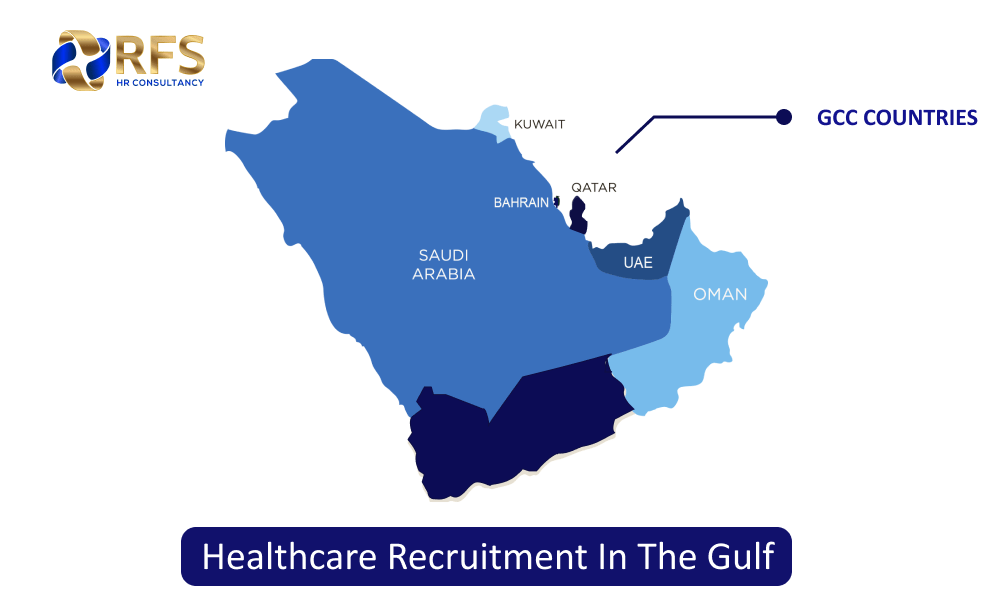The healthcare sector constantly changes, adjusting to new technologies, demographic shifts, industry reform, and other developments. As the population ages, the rising demand for medical specialists and health workers is one of the most essential developments in health services.
Although various factors contribute to establishing and implementing changes in health services, environmental and technological factors are significant drivers of change. Changes in the demographics of doctors, illness trends, and technology all influence changes in the healthcare system.
In the health sector, everything is constantly changing. Health services trends, aging demographics, and technology improvements all influence the industry’s future, given how important it is to monitor societal changes to predict the future of healthcare.
Table of Contents
Healthcare Landscape in the Gulf
The Gulf region comprises nations with differing economic development, infrastructure, and healthcare systems. Medical technology, infrastructure, and knowledge have advanced due to significant expenditures made in the health sectors by nations such as the UAE, Saudi Arabia, Qatar, and Kuwait. Conversely, other countries need more funding resources and unequal access to health services.
In the Gulf countries, including UAE, KSA, Qatar, and Kuwait, the frequency of diseases linked to lifestyle, such as obesity, diabetes, and cardiovascular disorders, has been rising. This tendency significantly stresses healthcare systems due to rapid urbanization, sedentary lifestyles, and nutritional changes.
Trends Shaping the Future of Healthcare in the Gulf
A recent report from Colliers Healthcare Services states that the delivery of health services is being impacted by several factors, including the evolving landscape of health systems, the rising burden of chronic diseases, the aging of the population, rising patient expectations, and the quick advancement of treatment innovation and technology. Due to this, the human skill sets needed to meet the population’s present and future health services needs are changing.
Growing Demand for Healthcare Professionals
The GCC’s expanding population base has resulted in a shortage of health workers in many medical specializations. The need for more qualified and experienced indigenous doctors and nurses has left the region heavily dependent on foreign health workers. As of 2019, the GCC had 5.7 nurses and 3.2 doctors and dentists per 1,000 people. There was a noticeable decrease in density within the area.
The GCC governments have begun implementing initiatives to build and develop the requisite health workforce. These include encouraging training exchange programs, introducing post-graduate programs, offering opportunities for career advancement, and providing a variety of training courses in medical, scientific, technical, and specialized health services for the citizens.
Technological Advancements
The healthcare sector is undergoing a rapid technological transformation, and the industry’s future is increasingly digital. Artificial intelligence (AI), wearable technology, and telemedicine are examples of how technology transforms health service delivery, enhances patient outcomes, and cuts costs.
Health-tech entrepreneurs are incorporating digital technologies to aid millions of patients by bringing the future to the present. Combining these many technologies, which dramatically increases the impact, is the most significant disruption to the health industry.
Advances in digital healthcare technologies, such as wearables, digital therapeutics, virtual and augmented reality, computer vision, artificial intelligence, and remote diagnosis, are reshaping the health sector right before our eyes.
Demographic Shifts in the Region
The Gulf nations’ population is among the fastest-growing in the world. Healthcare spending is anticipated to rise in the Gulf countries, mainly UAE, KSA, Kuwait, and Qatar, to keep up with the growing strain on the social infrastructure and shifting healthcare demands. The population of GCC collectively reached 53.5 million in 2020, a 30% increase from 2000. The majority of these people live in the region’s cities.
Currently, most of the health spending is funded by the public sector. The Gulf health financing system is expected to continue to develop due to this delicate balancing act between rationalizing healthcare spending and investments and meeting the population’s growing health services requirements.
Challenges of Healthcare Recruitment in the Gulf
Talent Shortage
The need for medical experts is growing dramatically as the Gulf area builds more Medical Cities and Hospitals to improve access to care. In 20 years, the GCC would see a 240% increase in the demand for healthcare personnel.
The need for more employees has long been a significant problem in the Gulf’s healthcare sector. There is a need for more nurses and doctors. As such, the entire patient treatment burden falls on the existing employed staff. The COVID-19 pandemic of 2020 has made it worse by creating a significant demand for healthcare staff.
Qatar
In Qatar, the medical sector has a talent shortage. According to Abdullatif Al Khal, director of medical education at Hamad Medical Corporation, only five doctors graduate yearly despite the nation’s growing need for healthcare services. The biggest issue faced by the health sector is finding and keeping qualified employees.
Saudi Arabia
Colliers estimates that Saudi Arabia would need about 175,000 doctors by 2030. The country will also need more doctors because about 232,000 foreign doctors now work there. Saudi Nationals must fill the bulk of these positions as part of the healthcare industry’s effort toward Saudization.
United Arab Emirates
The market intelligence report from Colliers Healthcare & Education division’s most recent forecast states that by 2030, Dubai will need 6,000 physicians and 11,000 nurses, while Abu Dhabi will need 11,000 nurses and 5,000 allied health professionals.
Kuwait
The government of Kuwait consistently allocates funds towards delivering top-notch healthcare services throughout the nation, including free medical care to all Kuwaiti citizens at government facilities.
The lack of specially qualified medical doctors and the scarcity of professional medical doctors are the leading causes of Kuwait’s severe medical care issues, which push many Kuwaitis to seek high-quality care abroad.
Employee Retention
Retaining employees is one of the significant issues faced by the healthcare industry. Hiring and retaining competent health services staff members are equally tricky and crucial. One in three doctors is considering retiring early after COVID-19 after the pandemic, according to AAPPR data.
Healthcare organizations must maintain employee engagement and well-being, especially amid rising stress and burnout. The global epidemic has highlighted the need to support health workers’ mental and emotional well-being. Organizations must prioritize efforts like work-life balance, wellness programs, flexible scheduling, and mental health resources to draw and keep talent.
Cultural Sensitivity
The Gulf’s unique political and economic background must be considered when recruiting. The way the local environment influences recruitment has changed significantly during the past two years. When talking about recruitment in the Middle East, it is imperative to consider the region’s unique political, cultural, and economic circumstances.
Finding the perfect person with the correct talents, experience, and mindset is difficult. Still, other regional considerations exist, such as women in the workforce, rights, religion, etc. However, a company’s ability to expand and create value depends on hiring and retaining the proper people has become crucial. It is no longer an option.
Partnering with the Recruitment Agency
Talented and qualified healthcare personnel are in greater demand as the healthcare and medical industries expand substantially worldwide. Finding the proper talent for your organization, whether for medical assistants, doctors, nurses, or other health services professionals, may be challenging. A recruitment agency like RFS HR Consultancy can be the best partner in this recruitment journey.
Access to the Global Talent Pool
Access to a worldwide talent pool is one of the main benefits of working with a recruitment agency. An extensive global network of healthcare specialists is available to the top recruitment firms. This implies that compared to when you were looking to find talent alone, you’ll have access to a broader talent pool.
Moreover, healthcare recruitment firms possess a comprehensive comprehension of the health sector and its diverse sub-specialties, which enables them to promptly recognize and locate the most suitable applicants for your company.
Right Person for the Job
The top recruiting firms for healthcare have a thorough awareness of the health sector and its many specialties. Because of this, they can match qualified applicants with open positions, guaranteeing that the experts have the qualifications needed for the particular responsibilities you need to fill.
Additionally, hiring firms for the healthcare industry can offer invaluable advice and assistance with creating job descriptions and determining the essential qualifications required for each position.
Streamline Recruitment Process
Hiring can be significantly expedited by collaborating with a healthcare recruitment firm. The knowledge and resources of recruitment firms enable them to quickly locate and source the most qualified applicants for your company.
Agencies like RFS HR Consultancy have extensive experience performing in-depth background checks, candidate screening, and interviews. Doing this lets you focus on other essential aspects of your organization while saving time and money.
Final Thoughts
Saudi Arabia, the United Arab Emirates, Qatar, and Kuwait are at the forefront of the healthcare industry, making substantial investments in infrastructure, technology, and expertise. The need for health services professionals and medical specialists is growing as the population ages. The Gulf countries are investing in healthcare to increase access to care.
However, nations need to deal with issues such as scarce resources. The health sector will become more digital as wearables, AI, and telemedicine change patient outcomes and delivery. Recruiting firms can assist healthcare organizations in locating the best personnel for their healthcare need.




